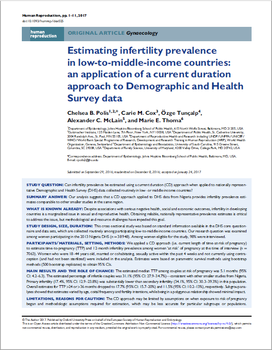In many parts of the world, the negative effects of infertility are staggering, particularly for women. But research on infertility globally has been relatively limited. Few nationally representative estimates of infertility prevalence exist -- likely in part because measuring infertility in prospective studies is quite expensive.
Drs. Thoma and McLain had recently published two groundbreaking papers (here and here) related to use of a methodological approach (called the "current duration approach") to estimate infertility in the United States. We adapted this approach for use in countries with data available from a Demographic and Health Survey (DHS). These are nationally representative surveys on a range of health issues, supported by the United States Agency for International Development, and conducted in over 90 countries around the world.
Our paper applied the current duration approach to DHS data from Nigeria (2013), and our estimates were consistent with those derived from prospective studies in the region. Thus, our paper represents proof-of-concept that applying the current duration approach to DHS data could potentially enable rapid, cost-effective infertility prevalence estimates for other countries around the world.
This project was a "labor of love" - with all of the work being done without funding, during nights and weekends, over the course of several years. We are grateful that the World Health Organization took an interest in this work, and agreed to support the "Open Access" publication fee, making the paper available without a paywall.
Making informed choices about the number, timing, and spacing of pregnancies is a fundamental human right. Fully enabling this right involves both supporting people to prevent pregnancy when desired, and supporting people to achieve pregnancy when desired. Our hope is that our work helps to advance estimation of infertility globally, and that ultimately, this leads to better knowledge on how to prevent and address this major health concern.

 RSS Feed
RSS Feed